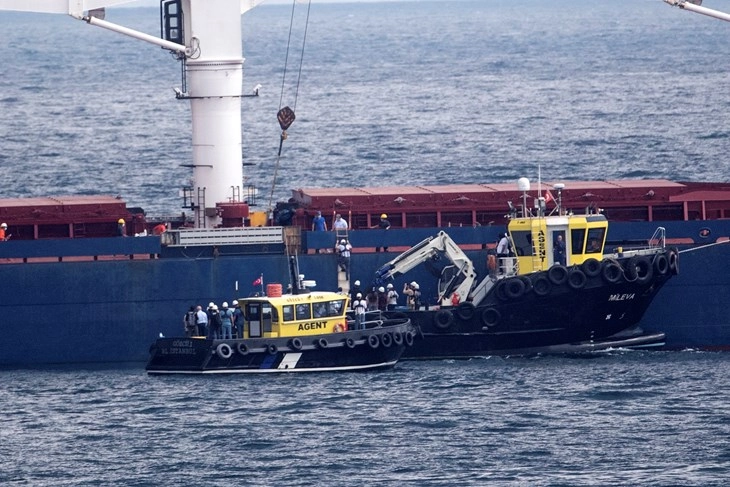UN: Transports continue despite Russian suspension of grain deal

New York/Moscow, 31 October 2022 (dpa/MIA) - Although Russia has suspended a grain agreement with Ukraine, the United Nations said on Monday that exports have been able to continue.
"Our understanding is that the initiative [grain deal] and commitments made within remain in force," UN Emergency Relief Coordinator Martin Griffiths told a UN Security Council meeting in New York. "[Russia] is only temporarily suspending activities in the implementation of the initiative."
Twelve ships had left Ukrainian ports on Monday and two headed for Ukraine to load food. It remained unclear at first whether the United Nations intended to continue exporting the grain shipments in the long term without Russia's participation.
"We look forward to welcoming them back as a full and active participant as soon as may be in the fulfilment of the goals that we evolved, agreed and signed up to. The United Nations is ready to address concerns [and] listen to suggestions from all sides," Griffiths added.
Russia suspended the agreement, which was brokered by Turkey and the UN, on Saturday. Moscow cited Kiev's drone attacks on its Black Sea Fleet as the reason, claiming Ukraine had exploited the protection of the grain shipment corridor for these attacks.
Griffiths questioned Moscow's stated reasons for suspending the agreement. "When initiative [grain deal] vessels are not in the area, the corridor has no special status," the emergency relief coordinator told the UN Security Council meeting.
"It provides neither cover nor protection for offensive or defensive military action. It can’t be used as a shield or a hideout. Neither is it a no-go zone," Griffiths explained.
The Russian representative, UN Ambassador Vassily Nebenzia, insisted that the agreement "is not to be implemented" without Russia.
"We cannot allow an unimpeded passage of vessels without our inspection," Nebenzia said.
Freighters which set off from Ukraine's Black Sea coast towards Istanbul on Monday are headed through a sea corridor that, according to the agreement, may not be attacked.
The Kremlin on Monday called such continued food exports via the Black Sea without Russian security guarantees "dangerous."
The UN, Ankara and Kiev had agreed on Sunday, however, to continue the shipments even without assurances of free passage by Russia.
Several freighters have already left ports on the Ukrainian Black Sea.
According to the United Nations, these included the freighter African Robin loaded with wheat, the SK Friendship loaded with soybeans and the Sealock carrying peas.
The UN said that the ships had left Ukrainian waters on Sunday for the Black Sea corridor protected by the agreement together with three other freighters.
The Ukrainian Infrastructure Ministry said a ship called the Ikaria Angel, sailing on behalf of the UN World Food Programme, had also departed. Its cargo - 40,000 tons of grain - is destined for Ethiopia.
Sixteen more ships were to set off through the corridor on Monday, according to a plan by delegations from the UN, Ukraine and Turkey. Russia had been informed about this, they said.
Kremlin spokesman Dmitry Peskov said on Monday that Moscow was prepared to compensate the recipient countries of the exports, which would receive less grain as a result of Russia's withdrawal from the agreement. It is not clear yet how this would work in practice.
In Brussels, the European Commission said that more than 14 million tons of agricultural goods has been exported from Ukraine so far via alternative trade routes expanded as a result of the Russian war, according to the European Commission.
In addition, 15 million tons of non-agricultural goods has been exported, a spokesperson for the Brussels-based authority said on Monday. He cited iron and steel as examples.
The so-called solidarity corridors were established in May. The main idea behind them is to expand existing trade routes in order to establish alternatives to exports via the Black Sea.
The Ukrainian Black Sea ports were blocked for a long time in the course of the war.
Meanwhile the conflict continued to rage on the ground in Ukraine, 250 days since the Russian invasion.
Russia fired missiles at several cities early on Monday, with air alerts sounding in many parts of the country, according to Ukrainian authorities.
Explosions were heard in the capital Kiev, the north-eastern city of Kharkiv and the south-eastern city of Zaporizhzhya.
Important infrastructure was hit again during the attacks. Initially, no deaths or injuries were reported.
Russia had declared that it is particularly targeting the neighbouring country's energy infrastructure.
Russia confirmed massive missile attacks on Ukrainian energy facilities. The Defence Ministry in Moscow said on Monday that Ukrainian military installations were also hit with missiles from bombers in the air and from warships.
"The targets of the strikes were achieved. All targeted objects were hit," ministry spokesman Igor Konashenkov said
Ukraine for its part has accused Russia of "energy terrorism."







